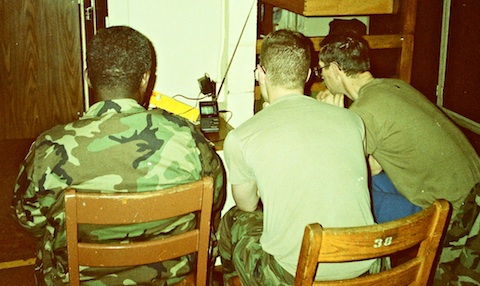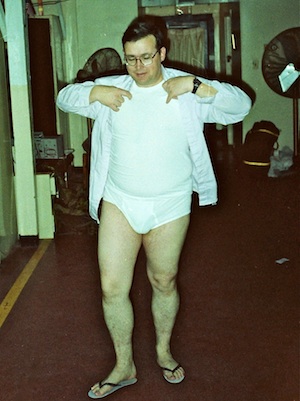Moving Out: To Bragg and Beyond
Ft. Bragg, NC—The one item of information unit members hoped would be more flexible was January 15: Iraq’s deadline for leaving Kuwait. The day came and went without incident. During the early evening of January 17 however, news was being reported that the US Air Force was bombing strategic targets in Iraq and Kuwait. Newscasters reported pinpoint bombing of command and control targets, while at the same time questions ran through the minds of soldiers everywhere: when will tactical targets be hit? When do we go in? About a week later the first question was answered. The answer to the second question was to be delayed for an indefinite period of time.

The defense of Saudi Arabia, known as Operation Desert Shield, had now become an offensive action to liberate Kuwait, and it was known as Operation Desert Storm. In retrospect, one soldier made an interesting observation about the new name. About a week before Desert Storm began, Chaplain Cursio gave members of the 432nd a small blue card listing psalms that could be used by soldiers for prayer, meditation or consolation during the war. The name Operation Desert Storm appeared on the card before any member of the general public had ever heard that name. The soldier very appropriately remarked, “The chaplains must have an inside source on their information.” He may have been stating a larger truth than he realized.
Flexibility was also the key in getting the answer to the question about the 432nd’s overseas’ departure. The unit was told to be ready both for delays as well as sudden decisions to deploy sooner thah expected. By Wednesday January 30, that question was also answered . The unit’s departure was set for Sunday and Monday, February 3-4. Unit members, would have to cancel plans for free time over the weekend, and in some cases, cancel plans for last minute visits by family members.
The unit began leaving Ft. Bragg on Sunday afternoon. Four groups were scheduled to leave on separate C-141 flights late Sunday and early Monday with two remaining groups scheduled for Monday night. Each of the flights was preceded by long waits in the Pope AFB terminal averaging about six hours. Then, at the appropriate moment, unit members boarded “the birds,” which the troops had become used to hearing and seeing from the barracks as the planes rose up over the sky line of Ft. Bragg and roared off to Saudi.
My Notes
-

CPT Stout, surprisingly half clothed. It was at Ft. Bragg that CPT Stout a deployment-long fraternization with one of our privates. Normally only senior NCOs are brought to the O-club as guests. One night, CPT Stout and I drove to the O-club. He brought the private along. Since there wasn’t enough room for everyone in the cab of the pickup truck, she rode in his lap. From that moment forward, they never went anywhere without each other. CPT Stout was warned about his behavior while we were in Kuwait City, but he and the private carried on until we returned to Green Bay.
- Another captain was responsible for preparing our communications for deployment. For reasons that will become apparent in a future note, I will refer to him as CPT Fingers.) But CPT Fingers was more concerned about taking advantage of the fact that he was at Ft. Bragg to prepare his promotion packet than he was in preparing for war. Since I had signal experience as a private, I took charge and got the situation squared away.
As it was, we did not have a sufficient number of radios or crypto. We usually operated deep into Kuwait City without any communications what-so-ever. A large percentage of the city’s population was Palestinian and there was the distinct possibility of Iraqi snipers staying behind the retreat, so if we had gotten ambushed it would have been bend-down-between-your-legs-and-kiss-your-ass-goodbye time. We would have been screwed. I know I wouldn’t have wanted to be the commander to have to explain to a family that their loved one had died because I hadn’t given him the radio he could have used to call for help.
Nor did the unit have sufficient training in proper radio-telephone procedures. It was common to hear a transmission along the lines of “432nd TOC, this is Capt. Smith. We’re at the food co-op.” If the Iraqis or Palestinians had been monitoring the transmission, they would have been told who, from what unit, was where. That’s a severe security breach. The CEOI and radio-telephone procedures are designed to prevent such faux pas. Only a few people, myself included, knew how to use either. Unfortunately if we had followed proper procedure no one else in the unit would have known what the heck we were talking about.
| Page 3 | Page 4 | Page 5 |
